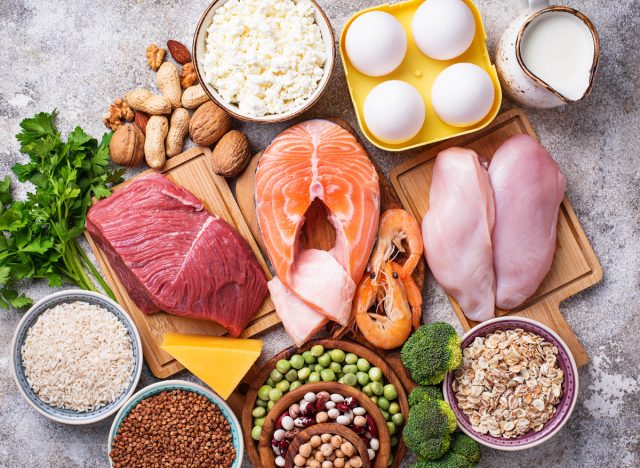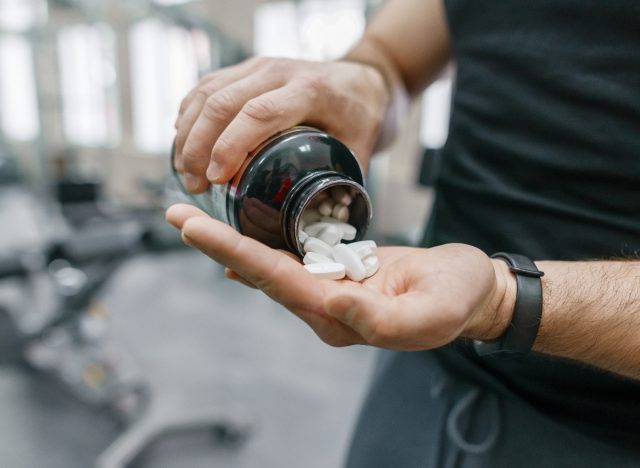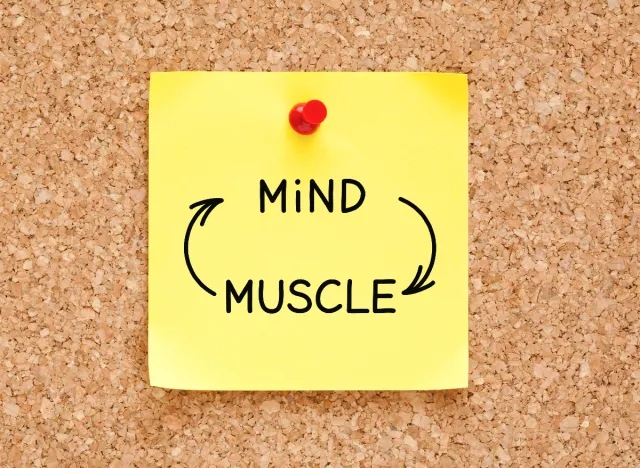11 Quick Muscle-Building Tips for Guys

Looking to ditch the Dad-bod and sculpt a muscular physique that turns heads and shows off your strength? If so, you're not alone, and need these quick muscle-building tips for guys in your arsenal. However, building muscle offers more benefits than just looking good. According to the National Institutes of Health (NIH), strength training exercises can support healthy weight loss, reduce chronic disease risk, and boost mental health. These benefits become increasingly important for men as they age since they can lose up to 3% to 5% of their muscle mass per decade after age 30, according to Harvard Health Publishing.
Let's face it: With the constant demands of work, family, and life in general, spending endless hours at the gym might not be in the cards for most of us. That's where ETNT comes in. We chatted with Michael Masi, DPT, a doctor of physical therapy and certified strength and conditioning coach with Garage Gym Reviews, who shares 11 quick muscle-building tips tailor-made for guys who want to see real results without sacrificing their precious time and energy.
Whether you're a newbie looking to bulk up or a seasoned lifter searching for that extra edge, these tips can help you reach your goals faster and more efficiently. Keep reading to learn more.
Then, check out these 9 Sneaky Ways To Build Muscle Without 'Exercising,' Experts Say.
Get your protein.

It's no secret that consuming adequate protein is essential for building muscle. According to a 2018 study published in Nutrients, you should aim for 1.6 to 2.2 grams per kilogram of body weight per day, spread across three or four meals. Lean meats, poultry, fish, dairy, and plant-based proteins like beans and tofu can all provide the protein your muscles need to grow and recover.
"Those looking to build muscle mass need more than just the stimulus to grow. They also need protein, which contains the building blocks for muscle. The best protein sources are meats, dairy, and eggs, but good proteins can also be found in beans, legumes, and soy products," says Masi.
Get enough calories.

Building muscle requires energy, so make sure you're eating enough calories to support your workouts and recovery. But this doesn't mean you should go on a junk food binge. Focus on nutrient-dense whole foods that provide the fuel your body needs.
"It's very tough to build muscle when in a caloric deficit. A faster way to grow muscle is to eat enough to allow for a small caloric surplus," says Masi. "A weight increase of about 0.5 to one pound per week would promote muscle growth without too much concomitant body fat accretion."
Do resistance training.

"Your body adapts to the stimulus you give it," says Masi. "If you subject yourself to lifting heavy weights routinely, your body will signal itself to build muscle to be better prepared for that stimulus in the future. This also works in the opposite direction, so find a resistance training program that is sustainable for you in the long run."
Whether you prefer weights, resistance bands, or bodyweight exercises, research shows that resistance (or strength) training is essential for muscle growth. Incorporate strength training into your exercise routine, focusing on compound movements that work multiple muscle groups simultaneously.
Perform multi-joint exercises.

"Big compound movements such as the squat, hinge, press, row, clean, and pull-up involve a confluence of muscle action across multiple joints," explains Masi. "This allows more muscle to work simultaneously than when performing single-joint exercises. The effect is a larger post-exercise release of anabolic hormones."
A 2015 study published in Physiological Reports found that multi-joint exercises like squats, deadlifts, and bench presses recruit more muscle fibers and lead to greater muscle growth. However, the downside is that these movements are often much more technical than their counterparts, so use proper form to reduce injury risk.
Stay hydrated.

Proper hydration is often overlooked in muscle-building but is essential for overall performance and recovery. Dehydration can lead to muscle cramps, fatigue, and decreased strength, so drink enough water throughout the day.
"Your hydration status dictates your blood volume, and blood plays an important role in exercise," Masi tells us. "During resistance training, your body increases blood flow to the target tissues. This increase in blood flow is largely to help bring the necessary ingredients to the muscle to sustain ATP (energy) production and flush out the metabolic byproducts of that energy system. This results in a swollen feeling, often referred to as 'the pump,' which is highly correlated with muscle growth."
Prioritize sleep.

Muscle growth doesn't happen in the gym. Quality sleep is when your body does most of its repairing and muscle-building, and research shows that sleep quality is positively associated with muscle strength. Aim for seven to nine hours of quality shut-eye per night to support your muscle growth goals.
"Every rep in the gym makes you weaker. It isn't until you rest and recover that you reap the rewards of all that hard work. If you don't do enough, you're mitigating muscle growth and attenuating recovery for subsequent training," says Masi.
Eat healthy carbs.

Research shows carbohydrates are your body's primary energy source—especially during intense workouts. Opt for complex carbs like whole grains, fruits, and vegetables to fuel your body with sustained energy.
"Carbs are the best signal for insulin, a major anabolic hormone," states Masi. "They're stored in skeletal muscle with water molecules, which makes the muscles swell and look larger. Beyond that, they're a great source of energy, which you'll need plenty of if you're looking to gain muscle."
Don't rely on supplements.

"Supplements can help, but only marginally," says Masi. "Creatine monohydrate is well-researched and known to be safe and effective. Whey protein powders are also a decent supplement—especially if you're having trouble hitting the protein targets we mentioned earlier. Pre-workouts may help push an extra rep or two in the gym, but the main ingredient is caffeine, which you could get from coffee or energy drinks."
While supplements can be helpful, they shouldn't replace a balanced diet. Focus on getting your nutrients from real food, and use supplements to fill in the gaps.
Control your reps.

The way you perform your reps matters. Focus on proper form and controlled movements rather than just lifting heavy weights. This approach reduces injury risk and helps you target the right muscles.
"Controlling your reps increases the total time under tension, which is one of the mechanisms for muscle hypertrophy. It embellishes the lift's eccentric (lowering) phase, which is a particularly aggressive form of muscle contraction that creates more disruption than its isometric or concentric counterpart. This disruption is a great impetus for muscle growth," explains Masi.
Engage the mind-muscle connection.

Research shows that harnessing the power of the mind-muscle connection by focusing on the muscle you're working on during each exercise is beneficial for gaining muscle. This mind-muscle connection can help you more effectively activate and engage the targeted muscle group.
"During sets, you want to feel the target muscle working," says Masi. "The feeling can be described as a cramping, burning, or stretching sensation that gets more aggressive with each rep. After the workout, you should feel fatigue and, sometimes, a delayed soreness in the target tissue. That indicates that you hit the tissues you were trying to target."
Track your progress.

"Progress is slow, and since you see yourself every day, the changes may be so small that you don't notice them," says Masi. "Taking pictures is a good way to get side-by-side comparisons over longer periods. You can also take seamstress tape and measure your chest, waist, hips, arms, forearms, calves, neck, and quads. This will give a more objective number to look at to ensure that what you're currently doing is at least moving you in the right direction."
Record your workouts, noting the exercises, weights, and repetitions. Tracking your progress allows you to set goals and see how far you've come on your muscle-building journey.
- Source: https://newsinhealth.nih.gov/2020/03/maintain-your-muscle
- Source: https://www.health.harvard.edu/staying-healthy/building-better-muscle
- Source: https://www.ncbi.nlm.nih.gov/pmc/articles/PMC5852756/
- Source: https://www.ncbi.nlm.nih.gov/pmc/articles/PMC6950543/
- Source: https://www.ncbi.nlm.nih.gov/pmc/articles/PMC4562558/
- Source: https://www.ncbi.nlm.nih.gov/pmc/articles/PMC5749041/
- Source: https://www.ncbi.nlm.nih.gov/pmc/articles/PMC6615069/









